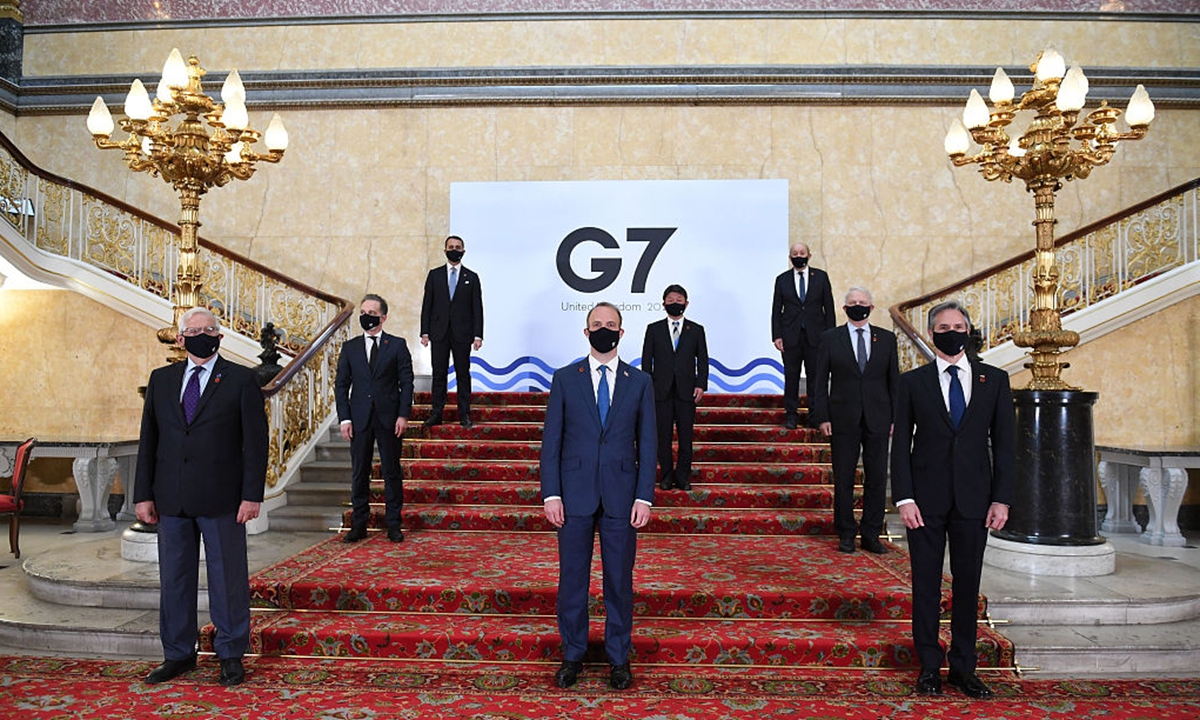
Photo: VCG
In the face of G7 foreign ministers' accusations against China over its so-called "human rights violations" and supportive rhetoric for the island of Taiwan's participation in WHO forums and the World Health Assembly (WHA), Chinese experts said that the move by some Western countries will further undermine peace and stability across the Taiwan Straits for their own political interests.
In a joint statement issued after the G7 foreign ministers' meeting on Wednesday, the island of Taiwan is mentioned separately in scenarios of maintaining "peace and stability" across the Taiwan Straits, and strong opposition to "militarization, coercion, and intimidation in the region," as well as backing Taiwan's participation in WHO forums and the WHA, which will be held from May 24 to June 1, 2021.
Some analysts viewed the tough-sounding statement as a repeat offender that serves political and ideological purposes against a backdrop of China-US tensions.
Xin Qiang, deputy director of the Center for US Studies at Fudan University, told the Global Times on Thursday that the pro-secessionist Democratic Progressive Party's refusal to accept the one-China principle is the root cause of the WHA rejection.
The island of Taiwan participated in the WHA as an observer for eight consecutive years from 2009-2016, when the island's then ruling Kuomintang party expressed support for the one-China principle amid relative harmony between the two sides of the Taiwan Straits.
The mainland does not throw its weight around just because it has become stronger, said Xin, noting that the mainland's position on Taiwan's participation in international organizations has always been clear, and reasonable arrangements must be made through cross-Straits consultation under the one-China principle.
Although the mainland objected to the DPP authority joining the WHA, Taiwan's access to WHO information and assistance is not affected, said Xin, noting that the mainland has been trying to provide support and assistance to Taiwan, but the DPP did not accept it.
Zhu Fenglian, spokesperson of the Taiwan Affairs Office of the State Council, said in January that the DPP authorities have thrown up political obstacles and frequently attacked the safety of mainland COVID-19 vaccines, even though some Taiwan compatriots have expressed a desire to receive them on the island.
In April 2020, WHO chief Tedros Adhanom Ghebreyesus slammed the racist comments and death threats from the island of Taiwan aimed at him. He said Taiwan's external affairs authority "didn't disassociate" itself from it.
The West portrays Taiwan as a pitiful victim of a political struggle, which is not in line with the facts. And the US is only playing with words when it says "Taiwan's absence may produce global epidemic prevention loopholes," Xin said.
With the new epidemic surge, Western countries are trying to claim the moral high ground, using the Taiwan card to reinforce the "authoritarian image" of the mainland not valuing human rights, Xin said.
By denouncing Beijing, Washington can gain the island's gratitude and cooperation, while in Taiwan, the DPP can set off another round of anti-mainland sentiment to serve its rule, the expert said. He added that other G7 countries' ostensible pandering to the US is equally for their own interests.
Such actions will not open the door for Taiwan's participation. On the contrary, it will only further raise tensions in the Taiwan Straits, Xin said.

